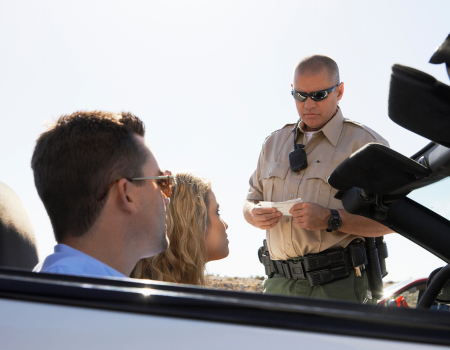
Does a Passenger Have to Show an ID in Arizona?
 By now, we’ve all seen the videos of passengers refusing to show an ID during traffic stops. Is this legal? Although you might have numerous reasons for safeguarding your ID, legislation in Arizona does give authority figures the ability to require ID presentation in certain scenarios.
By now, we’ve all seen the videos of passengers refusing to show an ID during traffic stops. Is this legal? Although you might have numerous reasons for safeguarding your ID, legislation in Arizona does give authority figures the ability to require ID presentation in certain scenarios.
In this article, we’ll cover the situations that require ID remittances, what rights you have as a passenger in Arizona, and the potential consequences of noncompliance. If you have already been involved in a law enforcement encounter, it’s important to seek representation right away.
Arizona is a Stop and ID State
 In Arizona, law enforcement officers can request your identification if they have reasonable suspicion to believe you are involved in criminal activity. Reasonable suspicion means that you have or are in the process of committing a crime. Law enforcement officials must be able to prove reasonable suspicion, as a “hunch” won’t hold up in court.
In Arizona, law enforcement officers can request your identification if they have reasonable suspicion to believe you are involved in criminal activity. Reasonable suspicion means that you have or are in the process of committing a crime. Law enforcement officials must be able to prove reasonable suspicion, as a “hunch” won’t hold up in court.
The other situation that gives law enforcement the right to request your ID is lawful detention. Lawful detention triggers the Stop and ID law and is commonly seen in traffic stops, investigatory stops, and arrests.
If law enforcement does have legal grounds for requesting your ID, you must provide your true full name and furnish your ID. However, you do not need to carry any type of identification that substantiates your address or date of birth.
Your Arizona ID Rights
Outside of reasonable suspicion and lawful detention, you do not need to show law enforcement your ID or answer any questions regarding your activities or destinations. Whether you are in the midst of a routine traffic stop or any other conversation with law enforcement, you have the following rights under Arizona law:
- Right to Remain Silent – Although Arizona’s Stop and ID law requires you to furnish your ID and legal name in certain situations, you have the right to avoid any other information requests or probing questions.
- Right to Refuse Consent to Search – Arizona law enforcement officials cannot search you or your vehicle without your consent, probable cause, a warrant, or legal grounds.
- Right to an Attorney – If you are being detained, you have the right to request an attorney during questioning.
These rights apply to both drivers and passengers in a motor vehicle. Knowing these rights can help you prepare if you are pulled over or detained by law enforcement officials.
Consequences of Noncompliance
 Failing to provide an ID in Arizona is a criminal offense. If law enforcement has reasonable suspicion and you refuse to show an ID, you could be detained. Both failure to provide a license and failure to provide identification are considered class 2 misdemeanors, with up to $750 in fines. A maximum of 4 months in jail and probation can also be consequences depending on the circumstances.
Failing to provide an ID in Arizona is a criminal offense. If law enforcement has reasonable suspicion and you refuse to show an ID, you could be detained. Both failure to provide a license and failure to provide identification are considered class 2 misdemeanors, with up to $750 in fines. A maximum of 4 months in jail and probation can also be consequences depending on the circumstances.
Summary
Do you believe you were wrongly required to show an ID in Arizona? How about being detained because of refusing identification? If you find yourself in either of these situations, contact our team at The Law Office of Zayed Al-Sayyed right away. It’s important to have the right representation when working through these matters.
Zayed Al-Sayyed
Latest Posts
Arizona Car Seat Laws 2025
What are the Arizona car seat laws in 2025? At what age can you move a child out of a car seat? Arizona has strict seat belt laws that look to reduce...
Are Lawyers Allowed to Wear Hijab?
Are lawyers allowed to wear hijab? What is the dress code in the courtroom? Do these laws vary by jurisdiction? Understanding the legality of religious...
